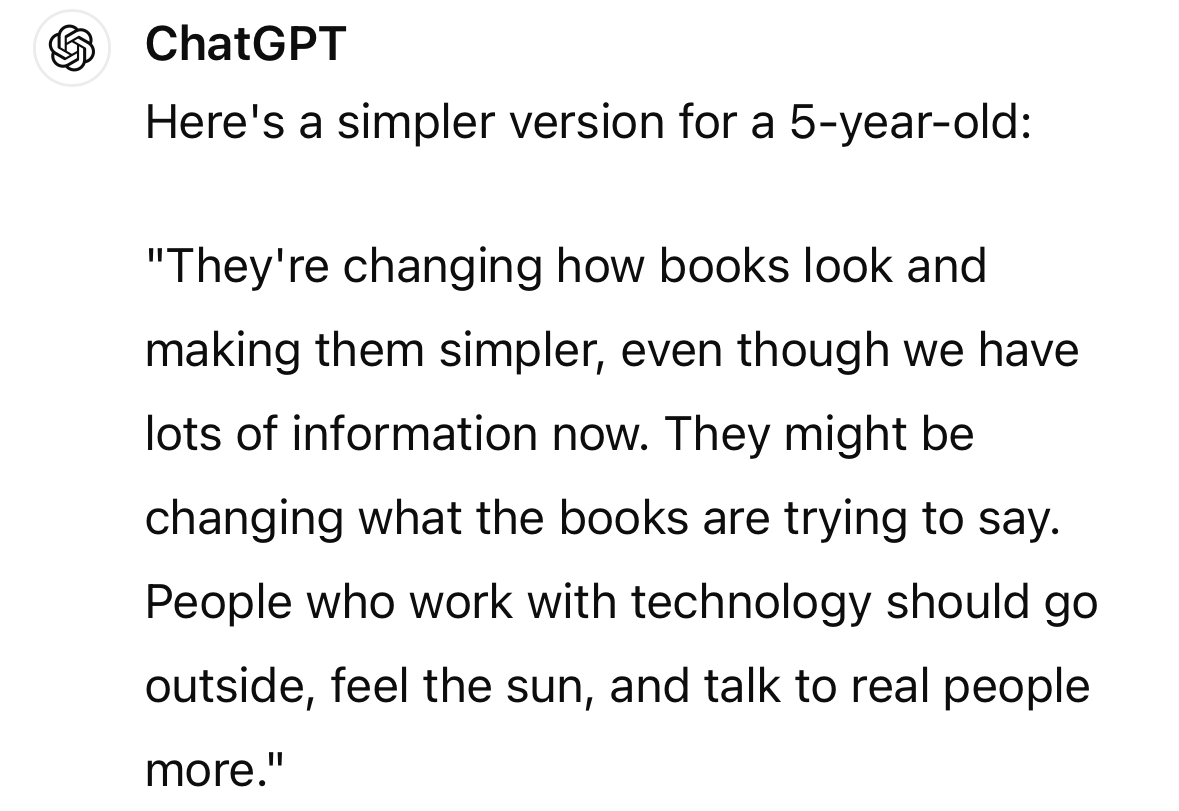So they’re ruining the original artistic vision, dumbing down literature despite existing whithin the greatest age of information, all while possibly ruining the original message and meanings of the book. Tech bros need to walk outside, touch grass, feel the warmth of the sun on their skin, and maybe try talking to an actual human for once in their life.
I dunno - if A.I. is suggesting tech bros launch themselves into the sun, I could maybe get behind it.

I’m proud of my demon spawn
She’s a tech savvy electrical engineer who spends her working hours mucking about with semiconductors.
When she’s not at work, which seems to be pretty much all day every day, she’s out on remote hiking trails with primitive camping gear.
From this old man’s perspective, she’s living the ideal balanced life.
Computer engineer here. I’m similar, spend a lot of my time mucking w/ semiconductors & such at work - I wouldn’t quite say CompEs and EEs are “tech bros” though. Tech savvy? Sure! But tech bros I like to think are the people who are more interested in monetizing tech than actually knowing how to use it.
That said, I most certainly consider myself a demon spawn.
Wow it’s like they’re actively trying to make people dumber and not even hiding it anymore
You don’t needs smarts anymore. We have calculators and AI.
Calculators are no replacement for smarts. They just take away the parts that don’t need actual thinking.
Tools exist for a reason. I’ve done signal processing by hand, it sucks.
How is learning a new language being dumber? This is awesome.
Something like this to produce graded readers is a great idea, but I don’t see anything in the ad itself that indicates it’s for language learners. If this is for a general audience for native speakers, then it’s enabling people to avoid learning to read (and ultimately use) more complex and nuanced language, in favor of infantilizing consumers and spoon feeding them everything.
The only use case I could see this being a positive for when aimed at native speakers would be something like adult literacy programs, or maybe homeschooling for kids with difficulties learning to read who don’t have the trained, professional support that one would hope they might have in a more typical school setting. For adults who struggle with illiteracy, I could see this being quite beneficial, though. It’s something that people will often be embarrassed about to begin with, and somebody who’s feeling self-conscious about this could be demotivated by only being able to read books aimed at children. Even if they say “Screw it, I need to do this,” it can be difficult to maintain motivation and interest when the only content you can find at your reading level is written for little kids. If they could have adult materials adapted to a level that’s challenging but manageable for them, I could certainly see that being a good thing.
language evolving doesn’t make people dumber
It does if that “evolution” consists of removing large or complex words simply because they’re “too hard”
They aren’t removed because they’re too hard, they’re removed because they’re inconvenient. They are removed when there is a more succinct and/or better understood alternative, for example “evolution” doesn’t have a good alternative to replace it. Memorizing relatively obscure words isn’t intellectual, and as simple building blocks as possible can often better communicate more complex ideas. There’s a reason C is better liked than C++
the literary equivalent of:

That was the sanitisation of Roald Dahl’s books, which already happened and was likely celebrated on Lemmy.
likely
You’re just straw manning without the commitment.
I’m gardening, what are you talking about.
Could you maybe give some links for the ones who didn’t get what you’re writing about, like I did?
Yeah, those edits were idiotic, all right, thanks for sharing
But I was more keen to see who celebrated those. Although, I am sure such people probably exist not only in the Dahl Estate
It was possibly on Reddit, but you can imagine the rhetoric. I actually do think it was on Lemmy. I believe I said that the Oompa-Loompas being literal African Pygmies was a bit much, and could remember feeling that way even as a young child. I think even Mr Dahl himself might have come to the same conclusion in later life.
But that’s not the great Gatsby that’s the ok Gatsby
Content/context lost in the “simplification”:
The speaker no longer feels they are in a vulnerable age. The speaker has a more formal relationship with their father. The “something” is specifically advice. The advice can change meaning depending on your perspective of it.
While it’s great as an introduction to a language, it’s NOT the same story. Not to mention, we already have things like SparkNotes from humans who have broken these stories down.
I love that they picked a book that is 90% nuance and symbolism for a tool that destroys nuance and symbolism…it’s like claymation Shakespeare celebrity death match.
Reduce teen literacy levels with this one easy step!!! Teachers hate it!!!
Did you mean “BADDEN YOUNG READNESS CHEAP!”
Brought to you by Brawndo©️*”FU, I’m Brawndoing!”*
I think that’s too short-sighted. I remember reading The Great Gatsby and I didn’t like it, because it was so hard to decipher. That leads to either reading it only superficially or not at all. How does that help teen literacy?
If you want to increase teen literacy, give them something to read that they actually enjoy or care about. High-society of (literally) a hundred years ago doesn’t help.
How does that help teen literacy?
We shouldn’t be pushing great literature on teens. They lack the life experience to even appreciate it. They mark it down as “read” and then it’s off their list for life. All we do by pushing crap teenagers don’t get and therefore don’t like on teens is to inoculate them from great fiction. Let them read whatever they like.
The timeless stuff doesn’t become apparent as such until one’s thirties anyway.
Part of the point of reading literature is appreciating how authors write books. “Literacy” includes being able to read and understand diverse styles of writing. This seems more like it’s geared toward passing standardized tests that require reading comprehension.
Turn HARD books into EASY books by learning what words mean!
"It was the age of wisdom, it was the age of foolishness, it was the epoch of belief, it was the epoch of incredulity, it was the season of light, it was the season of darkness, it was the spring of hope, it was the winter of despair”.
Becomes… “Things were confusing”





